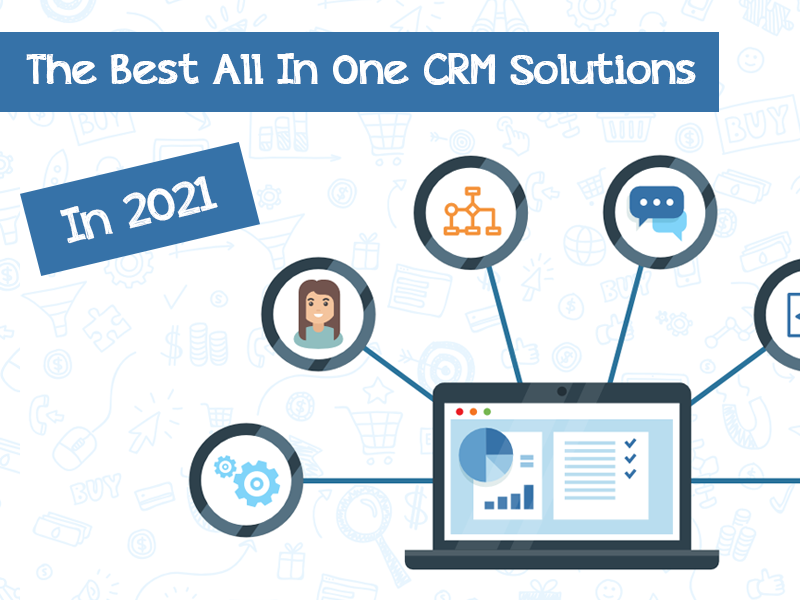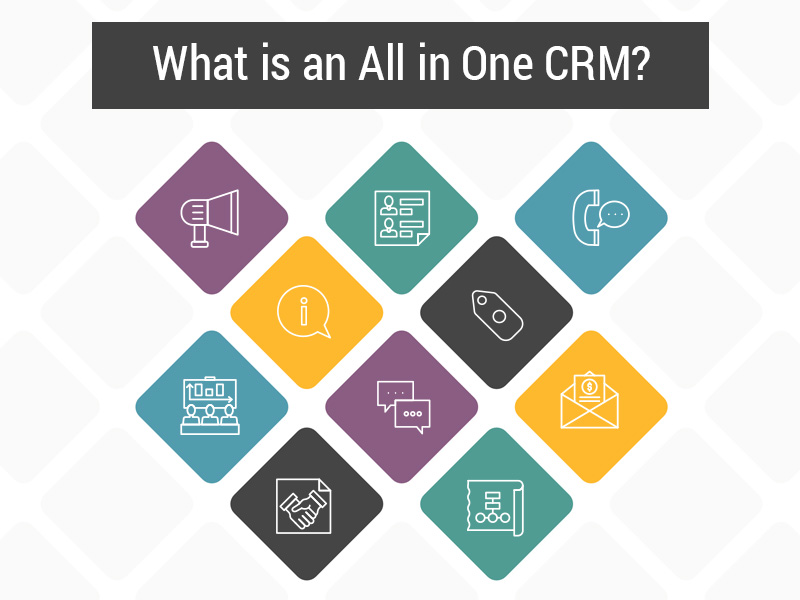All in one crm – All-in-one CRM (customer relationship management) software has emerged as a transformative solution for businesses seeking to streamline their operations and enhance customer experiences. This comprehensive platform seamlessly integrates essential CRM functions, offering a centralized hub for managing all aspects of customer interactions.
By consolidating contact management, sales tracking, marketing automation, customer service, and reporting capabilities into a single system, all-in-one CRMs empower businesses to gain a holistic view of their customers, foster stronger relationships, and drive growth.
All-in-One CRM Overview
An all-in-one customer relationship management (CRM) system is a comprehensive software solution that integrates all aspects of customer management into a single platform. It provides a centralized hub for businesses to manage customer interactions, sales, marketing, and support, streamlining operations and improving customer experiences.All-in-one CRMs offer numerous benefits, including:
- Centralized Data Management:All customer data is stored in one place, eliminating data silos and ensuring consistency across departments.
- Improved Collaboration:Teams can seamlessly share information and collaborate on customer-related tasks, fostering better communication and coordination.
- Enhanced Customer Experience:By providing a complete view of each customer, businesses can deliver personalized and consistent experiences across all touchpoints.
- Increased Productivity:Automated workflows and streamlined processes reduce manual tasks, freeing up time for more strategic initiatives.
Popular all-in-one CRMs include Salesforce, HubSpot, Microsoft Dynamics 365, and Zoho CRM.
Features of All-in-One CRMs
All-in-one CRMs are powerful tools that can help businesses of all sizes manage their customer relationships more effectively. These CRMs offer a wide range of features that can be customized to meet the specific needs of each business.
Some of the core features of an all-in-one CRM include:
Contact Management
All-in-one CRMs allow businesses to store and manage all of their customer data in one central location. This data can include contact information, demographics, purchase history, and communication history. Contact management features can help businesses keep track of their customers’ needs and preferences, and can also help them identify opportunities for upselling and cross-selling.
Sales Tracking
All-in-one CRMs can help businesses track their sales pipeline and identify opportunities for growth. These CRMs can track the progress of each sale, from lead generation to close. Sales tracking features can help businesses identify bottlenecks in their sales process and can also help them forecast future sales.
Marketing Automation
All-in-one CRMs can help businesses automate their marketing campaigns. These CRMs can send out automated emails, track customer engagement, and generate leads. Marketing automation features can help businesses save time and money, and can also help them improve their marketing ROI.
Customer Service
All-in-one CRMs can help businesses provide excellent customer service. These CRMs can track customer interactions, resolve customer issues, and provide self-service options. Customer service features can help businesses improve customer satisfaction and can also help them reduce customer churn.
Reporting and Analytics
All-in-one CRMs can provide businesses with valuable insights into their customer relationships. These CRMs can generate reports on customer activity, sales performance, and marketing campaigns. Reporting and analytics features can help businesses identify trends and make better decisions.
Benefits of Using All-in-One CRMs: All In One Crm

An all-in-one CRM unifies various customer-related activities within a single platform. By consolidating data and streamlining processes, it offers numerous advantages for businesses.
Key benefits of using an all-in-one CRM include:
Improved Customer Relationships
An all-in-one CRM provides a comprehensive view of customer interactions across different channels, allowing businesses to understand customer preferences and build stronger relationships.
- Centralized customer data improves customer service by providing a complete history of interactions.
- Personalized communication enhances customer experiences and increases satisfaction.
- Automated follow-ups and reminders nurture relationships and reduce customer churn.
Increased Sales Efficiency
An all-in-one CRM streamlines sales processes, automates tasks, and provides real-time insights, leading to increased sales efficiency.
- Lead management and tracking improve sales pipeline visibility and conversion rates.
- Automated workflows reduce manual tasks, freeing up sales reps for more productive activities.
- Real-time analytics provide insights into sales performance and areas for improvement.
Enhanced Marketing Effectiveness
An all-in-one CRM integrates marketing and sales activities, enabling businesses to create targeted campaigns and measure their effectiveness.
- Segmented marketing campaigns based on customer data improve targeting and ROI.
- Automated email marketing and social media management streamline marketing processes.
- Campaign analytics provide insights into customer behavior and optimize future campaigns.
Streamlined Operations
An all-in-one CRM centralizes data and automates tasks, reducing redundancies and improving operational efficiency.
- Centralized customer data eliminates silos and improves data accuracy.
- Automated workflows reduce manual tasks and streamline processes.
- Improved communication and collaboration among teams enhance overall productivity.
Considerations for Choosing an All-in-One CRM
Selecting the right all-in-one CRM for your business requires careful consideration of several key factors:
These factors include:
Business Size
- The size of your business will impact the features and capabilities you need in a CRM.
- Smaller businesses may need a CRM with basic features, while larger businesses will require a more comprehensive solution.
Industry
- The industry you operate in will also influence your CRM needs.
- For example, a CRM for a manufacturing company will differ from one for a retail business.
Budget
- The cost of a CRM can vary significantly, so it’s important to set a budget before you start shopping.
- There are CRMs available for all budgets, so you should be able to find one that fits your needs.
Integration Needs
- If you use other business applications, you’ll need to make sure that the CRM you choose integrates with them.
- This will ensure that your data is synchronized and that you can use your CRM to its full potential.
Implementation of All-in-One CRMs
Implementing an all-in-one CRM can significantly streamline your business processes and enhance customer relationship management. Here’s a comprehensive step-by-step guide to help you implement an all-in-one CRM successfully.
Data Migration
Data migration is the process of transferring data from your existing systems to the new CRM. It’s crucial to ensure accuracy and completeness during data migration to avoid data loss or inconsistencies.
- Identify all data sources and data types that need to be migrated.
- Clean and standardize the data to ensure consistency and accuracy.
- Choose a data migration tool or service to facilitate the transfer.
- Test the data migration process thoroughly before going live.
User Training
User training is essential for successful CRM implementation. Ensure that your team is well-versed with the CRM’s features, functionality, and best practices.
- Develop comprehensive training materials and conduct interactive training sessions.
- Provide hands-on experience with the CRM through simulations or mock exercises.
- Encourage ongoing training and support to foster continuous learning.
Process Optimization, All in one crm
Implementing an all-in-one CRM is an opportunity to review and optimize your existing business processes. Streamline workflows, automate tasks, and eliminate redundancies to enhance efficiency and productivity.
- Analyze current processes and identify areas for improvement.
- Configure the CRM to automate repetitive tasks and reduce manual effort.
- Establish clear workflows and protocols for different business functions.
Best Practices for Using All-in-One CRMs

All-in-one CRMs offer a comprehensive suite of features to streamline business processes and improve customer interactions. To maximize the benefits of these systems, it’s essential to adopt best practices for effective implementation and utilization.
Data Hygiene
Maintaining clean and accurate data is crucial for the success of any CRM system. Regular data hygiene practices ensure the integrity and reliability of the information stored in the CRM. This includes:
- Regularly reviewing and updating customer information, including contact details, preferences, and purchase history.
- Eliminating duplicate records and merging them to avoid data redundancy.
- Establishing data validation rules to ensure that data entered into the CRM meets specific criteria.
Regular Reporting
Regular reporting is essential for tracking the performance of sales, marketing, and customer service teams. By analyzing key metrics and trends, businesses can identify areas for improvement and make informed decisions.
- Establish clear reporting goals and objectives.
- Customize reports to track specific metrics relevant to the business.
- Schedule regular reporting intervals to ensure consistent monitoring.
- Share reports with relevant stakeholders to foster collaboration and decision-making.
User Adoption
Encouraging user adoption is crucial for the success of any CRM implementation. To ensure that users embrace the system and utilize its features effectively, it’s important to:
- Provide comprehensive training and support to users.
- Tailor the CRM to meet the specific needs of different user roles.
- Involve users in the implementation process to gather feedback and ensure buy-in.
- Continuously monitor user adoption and address any challenges or concerns.
Case Studies of All-in-One CRM Success
All-in-one CRMs have revolutionized customer relationship management for businesses of all sizes. Numerous companies have experienced remarkable success by implementing these comprehensive solutions, leading to improved efficiency, enhanced customer satisfaction, and increased revenue.
Here are a few notable case studies that demonstrate the transformative impact of all-in-one CRMs:
Company A
- Company Overview:A leading provider of SaaS solutions with a global customer base.
- Challenge:Disconnected systems and fragmented customer data hindered effective communication and personalized experiences.
- Solution:Implemented an all-in-one CRM that centralized customer information, streamlined workflows, and provided real-time insights.
- Results:Improved sales productivity by 20%, increased customer satisfaction by 15%, and reduced customer churn by 10%.
Company B
- Company Overview:A rapidly growing e-commerce retailer with a diverse product portfolio.
- Challenge:Manual processes and lack of customer segmentation hindered personalized marketing campaigns.
- Solution:Deployed an all-in-one CRM that automated marketing processes, enabled customer segmentation, and provided data-driven insights.
- Results:Increased conversion rates by 12%, boosted average order value by 8%, and reduced customer acquisition costs by 15%.
Final Review

In conclusion, all-in-one CRMs have revolutionized the way businesses manage customer relationships. By providing a centralized platform that streamlines operations, improves communication, and enhances customer experiences, these systems empower businesses to achieve greater success and profitability.
Frequently Asked Questions
What is the primary benefit of using an all-in-one CRM?
All-in-one CRMs provide a centralized platform that streamlines operations, improves communication, and enhances customer experiences, leading to increased efficiency and profitability.
What are the core features of an all-in-one CRM?
Core features include contact management, sales tracking, marketing automation, customer service, and reporting and analytics.
How can businesses choose the right all-in-one CRM?
Factors to consider include business size, industry, budget, and integration needs.